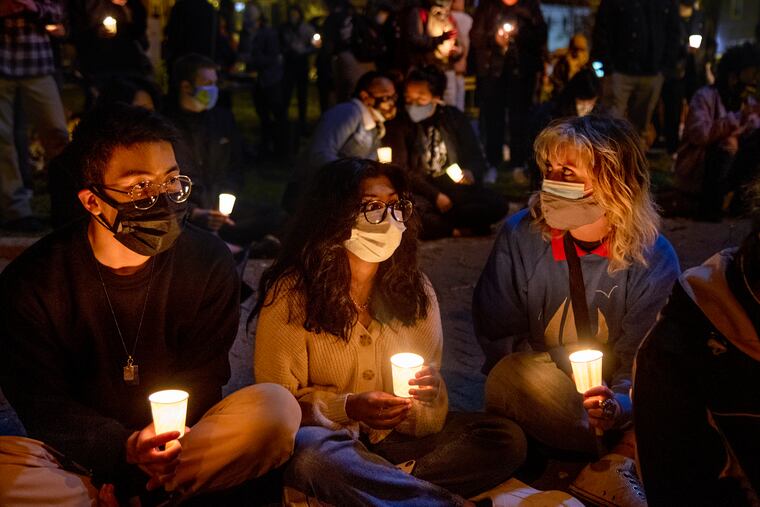Philly teens create podcast to destigmatize conversations about mental health
This youth podcast has discussed stigma surrounding antidepressants and antianxiety medications, as well as nonconfrontational approaches to start talking about mental health with parents.

As a student at Central High School, Andre Pak felt like it wasn’t possible to talk honestly about his feelings and emotions with his peers in a supportive environment. So during his senior year, he joined Creative Resilient Youth (CRY), a collective of 10 teens who use art to address the gaps in mental health dialogues at schools in the Philadelphia area.
Last year, Pak, now a 20-year-old sophomore at Drexel University, completed a video project on mental health in the city’s Asian community because “it’s not really talked about.”
The group had planned an art exhibition for May, to coincide with Mental Health Awareness month, but it was canceled due to the pandemic so they quickly pivoted to another way of increasing visibility about teen mental health issues — podcasting.
“During our weekly meetings, we always check in with one another,” Pak said. “It’s how we’ve gotten to really know one another. It’s something that we hold sacred because it builds trust and allows us to have conversations about cultural differences. As time went on, we just kind of figured that there was so much stuff we wanted to talk about that we had to find another way to talk about it.”
The group began recording the podcast, titled The New Normal, over Zoom last May. The first episode touched on their experiences with antidepressants and antianxiety medications during the pandemic, and the stereotypes surrounding those who take prescription drugs for mental health issues.
“People don’t realize that just because I take medication doesn’t mean that I don’t function like a regular human being,” one teen shared on the episode. “That doesn’t mean I’m a robot. That doesn’t mean you have to watch what you’re saying. You don’t have to feel odd around me or that I’m oversensitive.”
» READ MORE: Children are waiting longer in the ER for mental health care, study finds
The teens have since released four episodes, ranging in length from 30 minutes to over an hour.
Their focus on mental health comes at a crucial time, as recent data from the Centers of Disease Control and Prevention suggest that young adults, ages 18 to 29, have experienced the largest increases in anxiety and depression symptoms during the pandemic.
“We literally just started the podcast by making a list of things that we’re passionate about and stuff that we usually don’t get to talk about because adults typically tell us to be silent about things like our pain or drugs or other issues we have going on,” said Alana Mackey, a 19-year-old student at Wellesley College who writes poetry. “It was just really incredible to be able to write that down and then have a place to actually speak about it.”
Already, a few adult listeners have reached out to the teens to express appreciation for their openness. Some said they wished they had a program like CRY when they were younger, Pak said.
CRY was founded in November 2017 as part of the Creative Resilience Collective (CRC), a larger collaborative organization that works in the city’s underserved communities to fight stigma and increase access to self-determined mental health care, which allows people to choose the resources that best suit their recovery goals. The youth collective is mentored by a group of artists and organizers, but the teens have full control over their creations as they “unpack mental health stigma and process intergenerational trauma,” said Andrea Ngan, the founding director and a co-organizer of the CRC.
» READ MORE: Eating disorders were already on the rise among teens. TikTok is ‘like a trap,’ health experts say.
“These teams get to consensus building by defining how they want to collectively work together,” Ngan said. “With the podcast, they define the topic, they get together, and they organize the conversation.”
Besides the podcast, the teens started a mutual aid fund to help other young Philadelphians who lack access to mental health resources. They’ve sent care packages to applicants that contain things to help them feel better, such as happy lights (also known as light therapy lamps), journals, candles, and encouraging messages. The group has also started meeting with care providers to see how they can help others receive culturally sensitive therapy at no cost. And they are planning another art exhibition in June at Cherry Street Pier.
“A lot of their peers were affected in some way,” Ngan said. “There’s been a lot of grief. So we introduced the teens to mutual aid last year and they expanded it this year in a more formal way, which is really great.”
The group has also learned how to collaborate with other community organizations — last week, members of the collective spoke at a vigil for Christian Hall, a 19-year-old Chinese American who was shot and killed by Pennsylvania State Police while experiencing a mental health crisis in December.
» READ MORE: Kids’ mental health is still pediatricians’ greatest concern, one year into pandemic
Pak said he hopes the podcast will continue to drive more openness about how Philadelphia teens experience mental health issues.
“This podcast is kind of a way to amplify our voices and hopefully by doing that, it inspires people to have those conversations as well, especially with teenagers because I feel I didn’t really have anybody to talk to about my mental health before this,” he said. “Knowing that I’m not alone and feeling those types of ways is really powerful.”
Episodes of “The New Normal” are available here. (https://crycollective.carrd.co/)